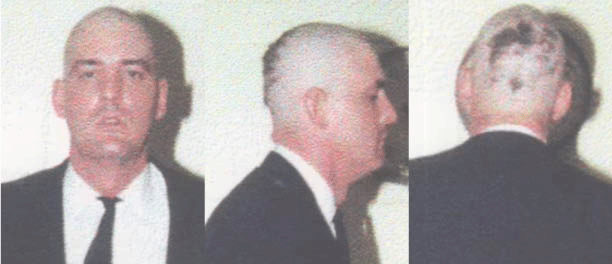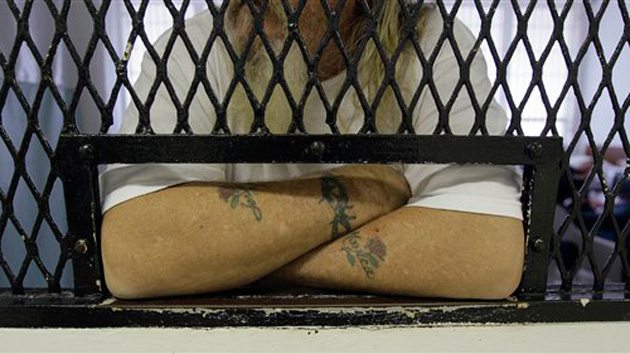
Missouri Department of Corrections
Cecil Clayton, 74, who had parts of his brain removed after an accident 40 years ago, is scheduled to be put to death on Tuesday. He was convicted of first-degree murder after killing a cop in 1996. Unless Missouri’s Supreme Court, a federal court, or Democratic Gov. Jay Nixon accepts the evidence that Clayton is mentally unfit for capital punishment, his execution will proceed.*
Missouri law states that a person cannot be executed if, as a result of mental disease or defect, he or she is unable to “understand the nature and purpose of the punishment about to be imposed upon him.” However, state law offers no mechanism for the defendant to set up a competency hearing after trial. The fact that Clayton was tried and sentenced before receiving an evaluation is complicating efforts to save him from the executioner, and creating what his lawyers call a “procedural mess.”
In 1972, Clayton was a sober, religious husband and father working at a sawmill in Purdy, Missouri. One day, a piece of wood flew from his blade, piercing his skull and entering his brain. Doctors eventually had to remove nearly one-fifth of his frontal lobe—the part of the brain that is crucial to decision making, mood, and impulse control. Clayton was completely transformed: His IQ dropped to 76, and he developed serious depression, hallucinations, confusion, paranoia, and thoughts of suicide. He relapsed into alcoholism, and his wife divorced him.
Clayton was officially diagnosed with chronic brain syndrome in 1983, which includes psychosis, paranoia, depression, schizophrenia, and decreased mental function. The severity of his condition rendered him unable to work. In 1979, a doctor said he was “just barely making it outside of an institution.” In 1984, another doctor found him to be “totally disabled” and the government placed him on disability benefits.
In 1996, following a dispute between Clayton and his ex-girlfriend Martha Bell, Barry County Deputy Sheriff Christopher Castetter was dispatched to Bell’s mother’s home in Cassville after reports of seeing Clayton’s truck on the property. It turned out to be Clayton, who was fighting with an ex-girlfriend. Castetter was later found sitting in his patrol car, shot in the head, and was pronounced dead at a nearby hospital. Clayton was apprehended at his home later that night by authorities, who found the murder weapon outside. When interviewed by police, Clayton denied his involvement but also said that Castetter “probably should have just stayed home.”
Clayton was charged with murder, but his competency to stand trial was never raised as an issue, according to one of his current lead attorneys, Elizabeth Unger Carlyle. His lawyers marshaled the “diminished capacity” defense to protect their client, but the jury did not concur that Clayton was mentally unable to carry out premeditated murder: He was found guilty and sentenced to death.
In the nearly two decades that he has been in prison, however, Clayton’s mental capacity has deteriorated so severely that he is now more unfit for execution, his attorneys argue. For years, his legal team has summoned psychiatrists to evaluate him in attempts to earn him a hearing to determine whether he is sane enough to be executed. Beyond the standard established by Missouri law, precedent established in the cases of Ford v. Wainwright and Panetti v. Quarterman requires that an individual be aware of his or her impending execution, and why it is happening, in order to meet constitutional standards preventing cruel and unusual punishment.
In a petition, Clayton’s lawyers note that psychologists—those commissioned by the defense, as well as the federal government—have repeatedly declared that Clayton does not meet the requirements necessary for execution. From 2004 to 2005, Clayton was studied for seven months by doctors as part of a federal habeas corpus proceeding to review Missouri’s decision. Dr. Lea Ann Preston, a clinical psychologist who led the team, wrote in an evaluation:
Mr. Clayton also reportedly has heard voices since his saw mill accident. He stated, “Sometimes it’s a good voice and calms me down,” but at other times he hears “Satan’s voice.” He said that Satan’s voice tells him, “They will kill you,” referring to the death penalty.
In 2008, Dr. William Logan, commissioned by the defense to examine Clayton several times, argued—unsuccessfully—that Clayton was unfit for execution:
While Mr. Clayton knows the State plans to execute him for killing Deputy Castetter, he believes his legal situation is instead a test of his faith and that God will not allow the punishment to occur as God has chosen him for another mission. Hence, he has no concept of a need for clemency, or capacity to understand matters in extenuation, arguments for executive clemency or rational reasons why the sentence should not be carried out.
“While Mr. Clayton knows the State plans to execute him for killing Deputy Castetter, he believes his legal situation is instead a test of his faith and that God will not allow the punishment…”
By 2012, Clayton’s mental state further declined because of his advancing age. “Mr. Clayton’s legal competency is clearly compromised,” Logan wrote. “His dementia has worsened secondary to aging and to his long term cardiovascular disease. His insight and judgment are further impaired. I do not believe he can meet the minimal legal standards of competence required for execution.” As recently as February of this year, Clayton’s cellmate said that Clayton was unable to operate the telephone on his own and could not understand how to order from the prison canteen, according to his lawyers. Nevertheless, on February 6, the state set an execution date of March 17 for Clayton.
Though Clayton’s execution date is near, his attorney Cyndy Short says there are three ways he could get at least a temporary reprieve: The Missouri Supreme Court could stay the execution and appoint a special official to hold a competency hearing; a federal court could stop the execution and direct a lower court to set up a hearing; or Gov. Nixon could stay the execution and order a hearing. If any of those fail to come through by Tuesday, Clayton’s legal team could appeal to the Supreme Court. Short says she is optimistic that Clayton’s execution will not happen next week.
In a statement, Clayton’s daughter, Jena, said, “He is brain-damaged, and talking with him is like talking to a child…I do not believe we are the kind of country that executes the disabled.”
Correction: An earlier version of this article misstated Gov. Nixon’s political affiliation.
















